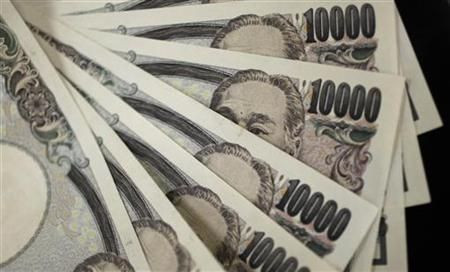Yen Down against Dollar after Bank of Japan Easing

(REUTERS) -- The yen fell on Tuesday as the Bank ofJapan eased monetary policy by expanding its asset-buying scheme, but the impact on the currency may prove short-lived while nagging worries over the euro zone crisis keep it supported as a safe haven.
The BOJ boosted its asset buying and lending scheme by 10 trillion yen ($130 billion), to 65 trillion yen, with the entire increase to be used for purchases of long-term Japanese government bonds (JGBs).
The dollar rose to a near three-week high of 78.19 yen on trading platform EBS with gains of around 0.6 percent on the day. The euro rose 0.7 percent on the day to 103.10 yen.
The knee-jerk reaction has been to sell the yen and that's understandable with the BoJ being a bit more active than it has been in the past, said Lee Hardman, currency strategist at BTM-UFJ.
This certainly reinforces the recent yen-weakening trend but that trend rests on broader financial market stability remaining in place. There are still risks of a disorderly outcome in Greece which would derail current yen weakness, he added.
A rally in global equity markets this year has helped to weaken the low-yielding yen which tends to fall when risk sentiment improves. In such an environment investors typically use it as a funding currency to financeinvestments in higher-yielding alternatives.
One key topside level for dollar/yen in the near term lies near 78.29 yen, around its late January high and a peak hit in late November.
The dollar probed above its 200-day moving average at 78.05. A daily close above there for the first time since 2011 would be a clear positive sign. Support was back at the top of the daily Ichimoku cloud around 77.43.
We think dollar/yen will struggle to get through the 80 yen area which has capped recent moves higher, said Lauren Rosborough, senior currency strategist at Societe Generale.
Although the BoJ has announced another expansion, when put into context it is catching up with easing measures taken in the U.S., she added.
EURO PARES LOSSES
The euro pared earlier losses against the dollar and hit a high of $1.3216 on EBS after a German survey of economic sentiment rose this month, defying expectations for a fall and adding to signs that the German economy is holding up in the face of the euro zone crisis.
The euro had fallen to session lows of $1.3127 after rating agency Moody's said it may cut its triple-A ratings of France, Britain and Austria while it downgraded six other European nations, including Italy.
Moody's move on euro zone sovereign ratings follows action by Standard & Poor's last month, when France and Austria lost their triple-A status while Italy, Spain, Portugal, Cyprus, Malta, Slovakia and Slovenia were downgraded.
Anyone observing the markets had to expect further rating agency downgrades and in the end Moody's only followed S&P's previous step, said Commerzbank analysts in a note.
The euro had been down about a cent from the previous day's high on worries about the remaining hurdles Greece faces in its bid to avoid a disorderly default.
The European Union has given the fragile ruling coalition of Prime Minister Lucas Papademos until Wednesday, when euro zone finance ministers are expected to meet, to specify how 325 million euros of the 3.3 billion euros demanded in budget savings will be achieved.
By the same deadline, Greek political leaders must give a written commitment to implement the terms of the deal.
The market is dominated by Wednesday's Eurogroup meeting and there is still huge tail risk for the euro, said Rosborough.
© Copyright Thomson Reuters {{Year}}. All rights reserved.






















